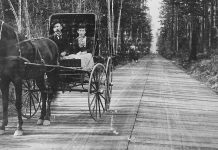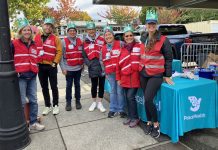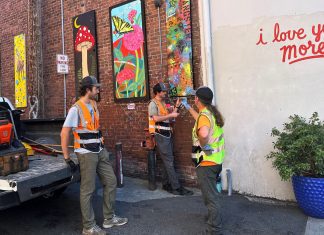Randy Craker has been working with the Lake Whatcom Water and Sewer District (LWWSD) for 30 years. In his free time Randy likes to hunt, fish and work on his cars. He grew up in Bellingham near Lakeway Drive, graduating from Sehome High School. He started his career as an auto mechanic but when a position opened at LWWSD he jumped at the chance to get outside and involved with people, both crew members he works with and the public he serves.
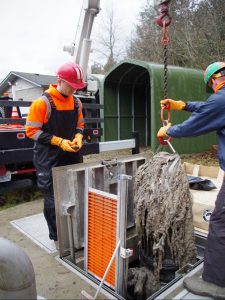
Randy loves his job. He works with a good group of people including Jason Dahlstrom and Jonathon Lydaird who’ve been with LWWSD for nine years. I met Randy, Jason and Jonathon eight years ago while working on the Cable Street Sewer Pump Station adjacent to Lake Whatcom on the south shore. As an engineer, I was hired by the District to rehabilitate some 40-year-old sewer pump stations. During design, we needed to measure the inside of a sewage storage tank. Dimensions weren’t completely known so Jason and Jonathon (being newest to LWWSD) got the short straw and were tasked with climbing down a ladder into the dark abyss of the below ground sewage tank to measure the inside.
During their measurements, Jonathon brought up a “Thomas the Tank” engine which I now have in my office. When I first got it, I displayed it proudly on my desk. My coworkers were disgusted so it’s now in a bag on a shelf. It was one of Jonathon’s strangest finds on the job. Usually it’s rags, dental floss and fibrous wipes. “If anything, I hope your readers will learn to throw away rags, floss and tampons,” Randy says. We are all in this together.
In fact, it’s best to throw away:
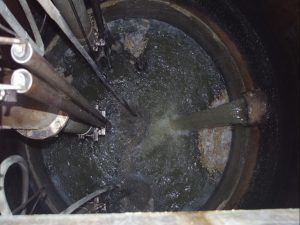
- Wipes
- Dental floss
- Rags and soiled underwear
- Tampons and pads
- Condoms
- grease
While pulling up two large 2,000-pound pumps during a cold rain in March, the crew removed over 50 pounds of rags. Randy calls the thick stuff, “Gloppenmeyer.”
“How do you spell that?” I ask.
“I don’t have any idea, I just say it,” Randy giggles. “Gloppenmeyer is thick rags, the solids including floaties and ‘lard trout,’” which roam in the wetwells the crew maintains. “Then there’s ‘Gloppenspiel,'” Randy clarifies. “It’s the thin stuff, the drool.”
Yeah, we’ve all been there. Being an officianado of potty talk I’m chuckling out loud unable to keep my cool. Randy is also amused. Jason and Jonathon also admit that having a sense of humor is important in this line of work.
Lingo and Definitions:
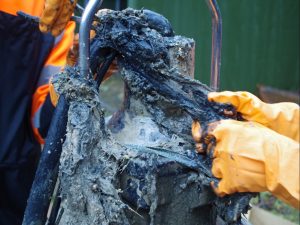
Gloppenmeyer – thick, solid sewage
Wetwell – the manhole where sewage collects before being pumped out
Gloppenspiel – thin, runny sewage
Lard Trout – balls of grease that stick together in sewage systems often sticking to equipment
Vitamin S – keep reading!
A favorite term of Randy’s is “Vitamin S.” The first time I heard him say it we were standing over the open lid of a manhole awaiting sewage to arrive from a pump station about three miles away. Down in the pipe connected to the manhole we could hear swirling and gurgling sounds and suddenly a sharp, warm wind blasted us from below. We both looked up, inhaled and immediately blurted, “yuck.” Randy then calmly looked down, laughing and shaking his head, “I just got my daily dose of ‘Vitamin S’,” he said. I’ve used the term ever since enlightening others in this line of work.
Once, Randy said, a new hire came on board and his first day was going to be spent removing stuck “Gloppenmeyer” from a wetwell using a shovel. Once the new hire knew what he was assigned to do, he called in saying, “I can’t do that,” and he quit. This work is not for the squeamish.
Randy told me a story when he was in a wetwell pressure washing the concrete when all of a sudden an adjacent pump system turned on, showering him in “Gloppenspiel.” Yeah, next time he made sure the crew shut down those pumps so they couldn’t shower him again. They have industrial grade showers at LWWSD’s shop building. They have come in handy a few times, I’m sure. Over the years, we’ve witnessed contractors diving into sewage tanks to rescue equipment lost below the surface. You may call this stupid. We call it dedication.
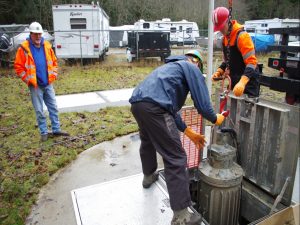
Randy’s cell phone is connected to LWWSD’s control system. He regularly gets text messages and phone messages indicating various alarms. While I spoke with him, he was responding to texts, “If I don’t respond, she’ll call,” he says. Randy calls the control system Dianne. When a coworker started a few years ago, he said, “I got 37 text messages from Dianne yesterday.” The coworker looked at him perplexed.
“I thought your wife’s name was Monica?” the coworker said. Randy chuckled and then explained who Dianne was. The coworker was relieved.
Randy’s favorite tool on the job is a Vactor Truck. A Vactor Truck has a powerful vacuum and storage tank along with a pressure washer. The Trucks can excavate neat holes down 10 feet or more. They are used to excavate and find pipe leaks. Vactor trucks speed up the process of finding leaks and take significantly less preparation than regular excavation using backhoes. This is because they clean and contain the excavation in their tanks. “This reduces dirty runoff to water bodies including Lake Whatcom,” Randy describes. “We can shut off a service line we know is leaking by digging a 12-inch wide hole 5-feet deep to reach a buried valve.”
Randy, Jason and Jonathon’s work is important. They maintain 28 sewer pump stations that keep all of sewage from Sudden Valley and the Geneva neighborhood east of Bellingham from flowing into Lake Whatcom. Lake Whatcom is the drinking water source for approximately 90,000 people including the City of Bellingham and Sudden Valley. If we did not have clean water to drink, we couldn’t live here.
Our region prides itself on water. Without Randy, Jason and Jonathon, would we have the water we need to survive and flourish? The crews that maintain Lake Whatcom Water and Sewer District’s infrastructure deserve our respect. The systems they maintain are out of sight, out of mind to most of us. Yet, if they didn’t do their jobs and do them well, we would see epidemics of waterborne illness. Getting to know them will give you a new respect for the work they do. My hope is that you will help Randy, Jason and Jonathon by throwing away that wipe in the garbage the next time you use one. Maybe you’ll also slow down the next time you see them working on the side of the road maintaining the pump and pipe systems that deliver your potable water and remove your sewage. Without them, our community would not be possible.
Got an idea for someone you’ve always wondered about? Maybe you already know them but think they deserve some limelight. I’m looking to get to know others that make our community a better place, a unique place, maybe even a stranger place. Drop me a line at submit@whatcomtalk.com.








